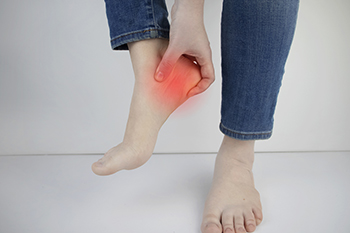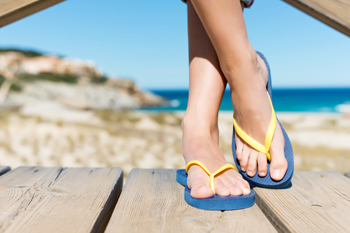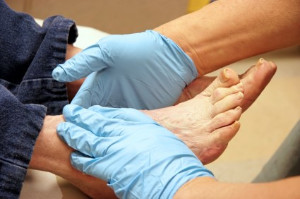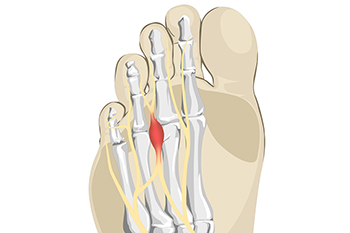Items filtered by date: June 2022
What Can Cause Plantar Fasciitis?

Plantar fasciitis develops as a result of an inflamed plantar fascia, which is the band of tissue that connects the heels to the toes and runs along the bottom of the foot. The fascia can become irritated for several reasons. These include obesity, standing on hard surfaces for long periods of time, and wearing shoes that do not fit correctly. Research has indicated that cases of plantar fasciitis have increased during the pandemic. This may be a result of more people walking or running outside on uneven surfaces when the gym was closed. Additionally, it is a possibility that flip-flops were worn most of the day while working remotely. These types of shoes have little or no arch support, which may be a contributing factor in developing plantar fasciitis. This condition can produce uncomfortable heel pain, and mild relief may be found by stretching the plantar fascia and Achilles tendon. Many patients have found it helps to wear shoes that offer good support. If you have this ailment, it is suggested that you are under the care of a podiatrist who can guide you toward the correct treatment.
Plantar fasciitis is a common foot condition that is often caused by a strain injury. If you are experiencing heel pain or symptoms of plantar fasciitis, contact one of our podiatrists from Summit Podiatry. Our doctors can provide the care you need to keep you pain-free and on your feet.
What Is Plantar Fasciitis?
Plantar fasciitis is one of the most common causes of heel pain. The plantar fascia is a ligament that connects your heel to the front of your foot. When this ligament becomes inflamed, plantar fasciitis is the result. If you have plantar fasciitis you will have a stabbing pain that usually occurs with your first steps in the morning. As the day progresses and you walk around more, this pain will start to disappear, but it will return after long periods of standing or sitting.
What Causes Plantar Fasciitis?
- Excessive running
- Having high arches in your feet
- Other foot issues such as flat feet
- Pregnancy (due to the sudden weight gain)
- Being on your feet very often
There are some risk factors that may make you more likely to develop plantar fasciitis compared to others. The condition most commonly affects adults between the ages of 40 and 60. It also tends to affect people who are obese because the extra pounds result in extra stress being placed on the plantar fascia.
Prevention
- Take good care of your feet – Wear shoes that have good arch support and heel cushioning.
- Maintain a healthy weight
- If you are a runner, alternate running with other sports that won’t cause heel pain
There are a variety of treatment options available for plantar fasciitis along with the pain that accompanies it. Additionally, physical therapy is a very important component in the treatment process. It is important that you meet with your podiatrist to determine which treatment option is best for you.
If you have any questions, please feel free to contact one of our offices located in Wilmington, Whiteville, and Wallace, NC . We offer the newest diagnostic and treatment technologies for all your foot care needs.
3 Major Problems With Wearing Flip-Flops

There are many reasons people wear flip-flops in the summer. Yes, they are easy to put on, they keep your feet cooler, and they are much more affordable than shoes so you can get them in many colors. But experts believe that wearing flip-flops on a regular basis can generate serious problems for your feet. First, most flip-flops do not provide adequate cushioning for your heels or support for your arches. They also lack the proper stability and may cause your gait to change, which can cause alignment problems in other body parts. Second, flip-flops offer little protection for your feet against injury, insect bites, and stings, or sunburn. Third, wearing flip-flops can leave you vulnerable to fungal infections, as well as other microorganisms that thrive in the water or sand. If you want further information about foot safety in the summertime, it might be wise to consult with a podiatrist for professional guidance.
Flip-flops are not always the best choice of footwear. If you have any concerns about your feet or ankles, contact one of our podiatrists from Summit Podiatry. Our doctors will assist you with all of your foot and ankle needs.
Flip-Flops and Feet
When the weather starts warming up, people enjoy wearing flip-flops. Flip-flops are comfortable, stylish, and easy to slip on and off; they're perfect for any summer beach goer. However, these shoes can cause harm to the feet.
How Can Flip-Flops Affect Me Long-Term?
- Ankle problems
- Hip problems
- Lower back problems
- Pain in the balls of the feet
- Problems with foot arches
- Changes in the way you walk
Are There Injuries Associated with Flip-Flops?
Yes. Since flip-flops are relatively weak and do not provide the same amount of support as sneakers, people who wear flip-flops regularly are more susceptible to injuries. On top of that, the open nature of the shoe makes your feet more prone to other problems, such as cuts and even infections. Common injuries and ailments include:
- Sprained ankles
- Blisters
- Infections
- Cuts and Scrapes
I like Wearing Flip-Flops. Are There Safe Alternatives?
When buying flip-flops, try to find ones that have sturdy soles and that are made of high-quality materials that will support for your feet. These flip-flops will cost more but will also last longer as a result.
If you have any questions please feel free to contact one of our offices located in Wilmington, Whiteville, and Wallace, NC . We offer the newest diagnostic and treatment technologies for all your foot and ankle needs.
How Diabetes Can Affect the Feet

Diabetes occurs when the body does not produce sufficient insulin or use it properly, which causes blood sugar levels to rise above normal. Diabetes can affect the health of the feet as well as many other parts of the body. Uncontrolled high blood sugar levels can damage blood vessels, reduce the blood flow to feet, and have serious consequences. Diabetic neuropathy is a type of nerve damage that affects the feet and legs and that many of those with diabetes develop. Such nerve damage can cause tingling and numbness in the feet, and one might not feel pain from a foot problem - a key warning sign that something is amiss in the body. Infections can arise, and if not tended to and healed, can lead to gangrene where tissue dies from lack of blood flow. Another complication of diabetes is peripheral vascular disease, a circulation disorder that limits blood flow to the legs and feet. Healing takes longer with inadequate blood flow, putting one at risk for infections. It is important for those with diabetes to practice good foot care. Beyond taking prescribed diabetes medications and monitoring blood sugar levels, diabetics should keep their feet clean, dry, and moisturized, wear well-fitting shoes, examine feet regularly for any cuts, sores, or blisters, maintain a healthy body weight, and exercise regularly. If you have diabetes, it is suggested that you include a podiatrist on your team of doctors so they can help you catch any foot problems you may not feel or know about, treat any issues you are aware of, and help you maintain healthy feet.
Diabetic foot care is important in preventing foot ailments such as ulcers. If you are suffering from diabetes or have any other concerns about your feet, contact one of our podiatrists from Summit Podiatry. Our doctors can provide the care you need to keep you pain-free and on your feet.
Diabetic Foot Care
Diabetes affects millions of people every year. The condition can damage blood vessels in many parts of the body, especially the feet. Because of this, taking care of your feet is essential if you have diabetes, and having a podiatrist help monitor your foot health is highly recommended.
The Importance of Caring for Your Feet
- Routinely inspect your feet for bruises or sores.
- Wear socks that fit your feet comfortably.
- Wear comfortable shoes that provide adequate support.
Patients with diabetes should have their doctor monitor their blood levels, as blood sugar levels play such a huge role in diabetic care. Monitoring these levels on a regular basis is highly advised.
It is always best to inform your healthcare professional of any concerns you may have regarding your feet, especially for diabetic patients. Early treatment and routine foot examinations are keys to maintaining proper health, especially because severe complications can arise if proper treatment is not applied.
If you have any questions please feel free to contact one of our offices located in Wilmington, Whiteville, and Wallace, NC . We offer the newest diagnostic and treatment technologies for all your foot and ankle needs.
Arthritis Can Cause Pain in the Feet and Ankles
What Is a Neuroma?

The pain from a foot condition that is known as Morton’s neuroma is generally found in the ball of the foot. A neuroma is another name for a pinched nerve or nerve tumor. It is often benign, and can grow and spread to other nerves in the foot. It is an ailment that affects the nerves between the third and fourth toes, and can cause severe pain and discomfort. Many patients describe the pain as feeling like a pebble or marble under the foot, and possibly cause difficulty in completing daily activities. Common reasons for this condition to develop can include frequently wearing high heels, and participating in running and jumping activities that can compress the feet in shoes. Additionally, medical conditions consisting of bunions and hammertoes may lead to getting Morton’s neuroma. A proper diagnosis consists of having a CT scan taken, or possibly an MRI. Many people have found mild relief when specific foot stretches are performed, and it can be beneficial to wear shoes that fit correctly. These types of shoes will have adequate room for the toes to move freely in, and this can help to achieve full range of motion and flexibility. Morton’s neuroma can be painful, and can hinder the ability to complete daily tasks. If you have pain in this part of your foot, it is suggested you consult with a podiatrist who can accurately diagnose and treat Morton’s neuroma.
Morton’s neuroma is a very uncomfortable condition to live with. If you think you have Morton’s neuroma, contact one of our podiatrists of Summit Podiatry. Our doctors will attend to all of your foot care needs and answer any of your related questions.
Morton’s Neuroma
Morton's neuroma is a painful foot condition that commonly affects the areas between the second and third or third and fourth toe, although other areas of the foot are also susceptible. Morton’s neuroma is caused by an inflamed nerve in the foot that is being squeezed and aggravated by surrounding bones.
What Increases the Chances of Having Morton’s Neuroma?
- Ill-fitting high heels or shoes that add pressure to the toe or foot
- Jogging, running or any sport that involves constant impact to the foot
- Flat feet, bunions, and any other foot deformities
Morton’s neuroma is a very treatable condition. Orthotics and shoe inserts can often be used to alleviate the pain on the forefront of the feet. In more severe cases, corticosteroids can also be prescribed. In order to figure out the best treatment for your neuroma, it’s recommended to seek the care of a podiatrist who can diagnose your condition and provide different treatment options.
If you have any questions, please feel free to contact one of our offices located in Wilmington, Whiteville, and Wallace, NC . We offer the newest diagnostic and treatment technologies for all your foot care needs.

